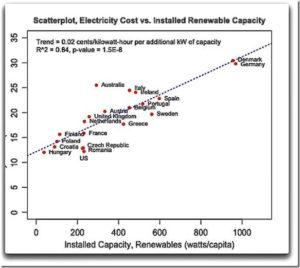by P. Homewood, May 8, 2025 in WUWT
UK Electricity Consumption
https://www.gov.uk/government/statistics/electricity-section-5-energy-trends
The REF’s new report on green energy subsidies noted that renewables subsidies are now costing £25.8 bn per year – or over £900 per household annually – about one third of which, £280, will hit the average domestic electricity bill directly.
For a long time, part of the gaslighting around the cost of Net Zero has been focus people’s attention over the impact on their energy bills.
However, as John Constable pointed out, only about a third of the cost hits the public directly via their electricity bills, because only a third of electricity is consumed by domestic users.
The other two thirds is used by industry and commerce, transport and the public sector.
But that does not mean that the public at large don’t end up footing the entire bill one way or another.
Higher electricity costs for industry and commerce mean higher prices in the shops. And higher electricity costs in the public sector mean higher taxes or poorer public services.
At the worst, businesses may shut or move their production abroad, leaving us all worse off.
Miliband and co would love you to think you are only paying a hundred quid or so for Net Zero. People would be horrified to learn that the price is nearer a thousand quid a year.
And that cost is of course just for starters. When we all have to buy expensive EVs and heat pumps we don’t want, we will be much worse off.


